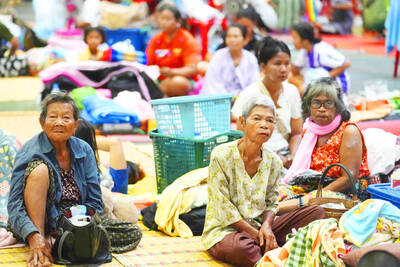Women are the hidden victims of a Brazilian security policy that favors warlike confrontations with drug gangs, Amnesty International said in a report released yesterday.
While women account for a fraction of homicides and are rarely listed as victims of police bullets, the violence in Brazil’s shantytowns often shatters lives and leaves families without their main breadwinners.
“I think by highlighting the plight of women, you see how the problem of public security affects the community as whole,” report author and Amnesty Brazil campaigner Tim Cahill said by telephone from London. “It takes away the discourse of war and conflict that has always been empty.”
Amnesty said the problem is particularly acute in the poor hillside neighborhoods above Rio de Janeiro, where police routinely trade fire with heavily armed drug gangs. Thousands are killed each year in the violence.
Almost all the dead are officially labeled “bandits” and the killings acts of self-defense. That designation denies the victims’ families the possibility of compensation or redress. Meanwhile a scarcity of police in the shantytowns leaves women vulnerable to be preyed upon by drug lords, said the report, which was based on interviews with women in six Brazilian states in 2006 and last year.
“The state violates the rights of these women in three ways,” Cahill said. “It supports policing practices that lead to killings, perpetuates a system that ensures access to justice is extremely difficult, if not impossible, and condemns them to intense hardship.”
The country’s top official for women’s policy, Nilcea Freire, said the government was working on many of the areas mentioned in Amnesty’s report.
“The situation of women worries us, but it is possible to turn it around,” Freire said. “But it won’t be from one moment to the next. The government is taking a series of measures.”
Cahill said the government needs to provide hostels to protect women from violence and needs to improve treatment of women in prisons.
The report referred to the widely publicized case of a 15-year-old girl who was kept for 24 days in a holding cell with 20 to 30 men in Para state. The girl said she was raped by the men repeatedly.
Cahill said the girls’ case was not an isolated incident: “Now we have situations like the girl in Para popping out of the woodwork.”
The report praised the government for a new law to protect women from domestic violence, but said the measure had yet to be fully implemented.

FOREST SITE: A rescue helicopter spotted the burning fuselage of the plane in a forested area, with rescue personnel saying they saw no evidence of survivors A passenger plane carrying nearly 50 people crashed yesterday in a remote spot in Russia’s far eastern region of Amur, with no immediate signs of survivors, authorities said. The aircraft, a twin-propeller Antonov-24 operated by Angara Airlines, was headed to the town of Tynda from the city of Blagoveshchensk when it disappeared from radar at about 1pm. A rescue helicopter later spotted the burning fuselage of the plane on a forested mountain slope about 16km from Tynda. Videos published by Russian investigators showed what appeared to be columns of smoke billowing from the wreckage of the plane in a dense, forested area. Rescuers in

‘ARBITRARY’ CASE: Former DR Congo president Joseph Kabila has maintained his innocence and called the country’s courts an instrument of oppression Former Democratic Republic of the Congo (DR Congo) president Joseph Kabila went on trial in absentia on Friday on charges including treason over alleged support for Rwanda-backed militants, an AFP reporter at the court said. Kabila, who has lived outside the DR Congo for two years, stands accused at a military court of plotting to overthrow the government of Congolese President Felix Tshisekedi — a charge that could yield a death sentence. He also faces charges including homicide, torture and rape linked to the anti-government force M23, the charge sheet said. Other charges include “taking part in an insurrection movement,” “crime against the

POINTING FINGERS: The two countries have accused each other of firing first, with Bangkok accusing Phnom Penh of targeting civilian infrastructure, including a hospital Thai acting Prime Minister Phumtham Wechayachai yesterday warned that cross-border clashes with Cambodia that have uprooted more than 130,000 people “could develop into war,” as the countries traded deadly strikes for a second day. A long-running border dispute erupted into intense fighting with jets, artillery, tanks and ground troops on Thursday, and the UN Security Council was set to hold an emergency meeting on the crisis yesterday. A steady thump of artillery strikes could be heard from the Cambodian side of the border, where the province of Oddar Meanchey reported that one civilian — a 70-year-old man — had been killed and

POLITICAL PATRIARCHS: Recent clashes between Thailand and Cambodia are driven by an escalating feud between rival political families, analysts say The dispute over Thailand and Cambodia’s contested border, which dates back more than a century to disagreements over colonial-era maps, has broken into conflict before. However, the most recent clashes, which erupted on Thursday, have been fueled by another factor: a bitter feud between two powerful political patriarchs. Cambodian Senate President and former prime minister Hun Sen, 72, and former Thai prime minister Thaksin Shinawatra, 76, were once such close friends that they reportedly called one another brothers. Hun Sen has, over the years, supported Thaksin’s family during their long-running power struggle with Thailand’s military. Thaksin and his sister Yingluck stayed